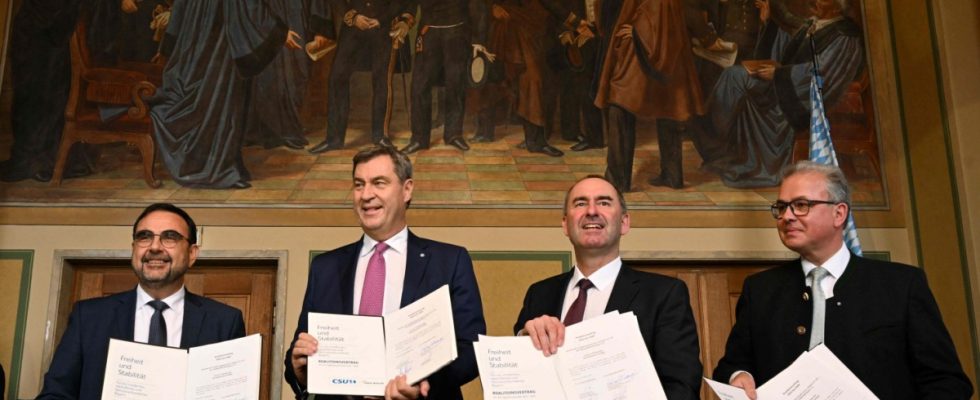Two and a half weeks after the Bavarian state elections, the CSU and Free Voters sealed the continuation of their government, which has existed since 2018. CSU chairman Markus Söder and FW boss Hubert Aiwanger signed the new coalition agreement on Thursday. The distribution and layout of the ministries have also been determined. This means that a power struggle for positions and influence is resolved unusually quickly. After a previous dispute over positions, the Free Voters now receive an additional ministry – four instead of the previous three departments. In addition to the ministries of economy, culture and the environment, they are responsible for the digital ministry, which the previous FW parliamentary director Fabian Mehring is to head. After five years, Education Minister Michael Piazolo has to make way for his previous State Secretary Anna Stolz. Thorsten Glauber retains the environment ministry, Aiwanger remains economics minister and deputy prime minister.
The Ministry of Agriculture, which Aiwanger had recently emphatically claimed for his party, was able to defend the CSU. However, Aiwanger’s ministry should be given additional powers, for example for hunting and state forests. In return, the areas of tourism and gastronomy go to the agriculture department. Unlike FW boss Aiwanger, Söder takes more time for his personnel decisions. He doesn’t want to announce the CSU’s cabinet list until November 8th.
The Free Voters increased their vote from 11.6 to 15.8 percent in the Bavarian election on October 8th and called for a fourth ministry. The CSU had lost slightly with 37 percent, but insisted on the previous distribution. The talks therefore started with reservations: Aiwanger had accused Söder of acting “girlish” and of not respecting FW’s success. After Aiwanger’s affair over an anti-Semitic leaflet and his populist Erdinger demo speech, Söder, in turn, asked the partners to make clear their position in the party system, i.e. “whether they consider themselves to be on the far right.”
The dispute over the ministries has now been resolved, on the one hand, by giving the Free Voters a fourth house – and, on the other hand, by handing over a state secretary with cabinet rank to the CSU. This leaves a total of five positions for the junior partner. According to the Bavarian constitution, the government is capped at 17 members in addition to the Prime Minister. This is now a compromise solution with which both parties can declare that they have achieved their goals.
A coalition, “not a love marriage,” says Söder
On Thursday, Söder and Aiwanger said they were confident that their power struggle had been pacified. The coalition agreement was put together “quietly, effectively and quickly,” said Söder: “The Bavarian coalition stands.” This is “not a love marriage,” said the Prime Minister, but the alliance is resilient. It was “successful to build new trust”. Aiwanger said that after “all the skirmishes in the past few months” they would now “look again at the common goals.”
The future coalition agreement contains a preamble that Söder considered necessary weeks ago with reference to the coalition partner’s behavior in the election campaign. It contains an explicit commitment to protecting democracy and a passage that can be understood as a reaction to Aiwanger’s heated beer tent speeches in rural areas: “We will not allow the city and the country to be played off against each other.” Söder called the coalition agreement itself a “really good course book” and all in all more than 70 “new projects” would be launched.
When it comes to immigration, the contract contains many appeals to the federal government: Berlin should advocate for a “turnaround” in migration policy. At the Bavarian level, they want to “use all existing scope for action to reduce incentives to move in.” “As far as legally possible,” asylum seekers should be switched to benefits in kind instead of money, for example via a payment card for supermarkets. One focus of the contract is to reduce bureaucracy; there should also be a Bavarian program for the construction industry, more daycare places and digital devices in schools. A “constitutional quarter of an hour” will also be introduced there as a weekly discussion format about the Bavarian constitution and the Basic Law. According to Söder, this is a reaction to the AfD’s strengthening in a symbolic state election among minors in September.
“If the government parties have to assure each other that they have both feet firmly on democratic ground, I will be worried for our beautiful Bavaria,” said Green Party parliamentary group leader Katharina Schulze. She finds the coalition agreement “unambitious”. Bavaria’s SPD leader Florian von Brunn warned that the numerous promises in the contract “will not be solved by pointing fingers at Berlin, but only in Bavaria.”

